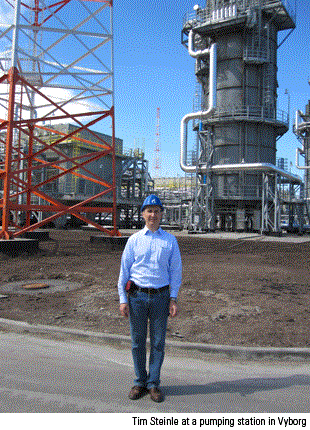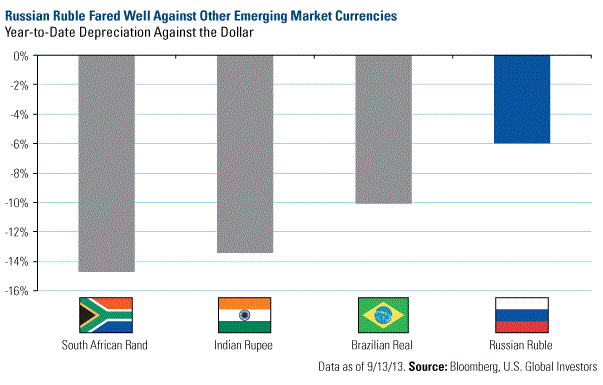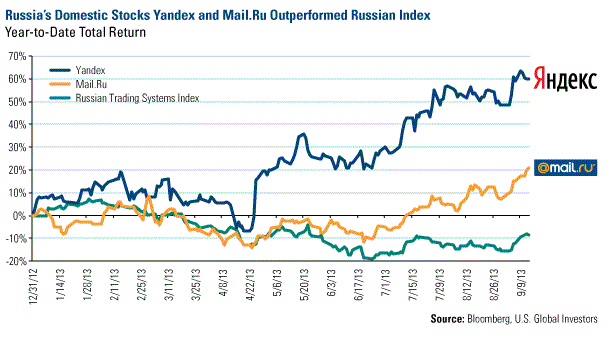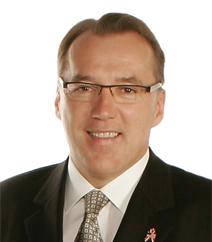Why It’s Hard to Ignore Russia
 Russian President Vladimir Putin created a stir recently when he shared his thoughts with Americans in an op-ed printed in The New York Times. According to The Times, very few pieces written by heads of state have been published by the paper and very few received the attention Putin attracted.
Russian President Vladimir Putin created a stir recently when he shared his thoughts with Americans in an op-ed printed in The New York Times. According to The Times, very few pieces written by heads of state have been published by the paper and very few received the attention Putin attracted.
But will the plea be influential? Will it change President Barack Obama’s or Americans’ opinion on the matter of Syria?
In recent years, Russia’s political stability and rule of law have been called into question, causing many investors to avoid the area. Yet, while Russia is a tough market to love and even easier to hate, the country is hard to ignore, says Tim Steinle, portfolio manager of the Emerging Europe Fund (EUROX).
While I was at Cambridge House’s Toronto Resource Investment Conference talking to investors about gold and resources, Tim was in San Antonio, Texas discussing his perspective on Russia on Canadian Business News Network with host Howard Green, Richard Jenkins from Black Creek Investment Management and John Hsu from John Hsu Capital Group. It was an insightful debate on finding opportunities in the sometimes challenging emerging countries of Russia, China and the Middle East.
Here is a summary of Tim’s perspective on the emerging Europe giant.
Q. A lot of big, sophisticated, institutional investors say it’s not worth the trouble to put your money in Russia. What do you say to them?
Since the Federal Reserve suggested ending its bond purchases, many emerging markets have suffered. Year-to-date through September 12, the MSCI Emerging Markets Index lost about 8.5 percent. Over the same time frame, Russian stocks have declined less than that, about 4 percent.
The Russian ruble also fared relatively well against emerging market currencies, as the country does not depend on external funding. Since the beginning of 2013 through today, the South African rand declined more than 14 percent, the Indian rupee lost 13 percent and the Brazilian real is down 10 percent. Comparably speaking, the Russian ruble looks stable.

Additionally, over the last 60 days, Brent crude oil increased about 15 percent, and a major oil-producing country such as Russia benefits from higher oil prices.
For these reasons, we believe people are taking another look at Russia.
Q: Novatek, an independent gas producer in Russia, is close to breaking the Gazprom monopoly on the gas export market. Will Gazprom fight that?
Surprisingly, it hasn’t yet. What’s interesting is that the Russian MICEX Index is heavily populated by oil names, but these companies tend to carry a very heavy tax burden. They are basically all running to stand still, drilling to replace the decline from existing wells while net production remains flat.
The gas market is a different animal. Novatek is Russia’s largest independent gas producer and “one of the best-run global emerging market oil and gas companies,” says UBS. The company has grown its domestic market share in leaps and bounds to the tune of about 20 percent per annum. It has developed smaller fields where Gazprom has not been successful. In the last three years, Novatek doubled reserves and some of those fields were formerly Gazprom fields.
In addition, Novatek is venturing into an inherently profitable LNG project with China located on the Yamal peninsula. According to UBS, the Yamal project might be able to “unlock significant long-term production upside for Novatek, partially liberating it from its dependence on Gazprom’s pipeline network.”
The media has been focusing on China’s deals on an inland pipeline in Siberia with Gazprom, yet there’s a huge discrepancy in price. China wants to pay only $3 per million British Thermal Units (mBtu), but Russians want to charge $12 per mBtu.
While the Chinese want a stake in both areas, as well as some flexibility, Novatek is a clear winner so far. For the first time in Russian history, the Gazprom monopoly will be broken. This is a big deal for an independent company, as it allows Novatek to become “an energy player of genuine global standing,” says UBS.
Q. So, if you put your money in Russia, what about political stability?
A key to investing in Russia is to focus on domestic areas of the market that are profitable and growing. While China’s urbanization gets a lot of attention today, in the case of the Soviet Union, urbanization happened back in the thirties. Russia has a middle class and its GDP per capita is much higher than that in China.
Within domestic markets, one promising company is Mobile TeleSystems, which provides mobile and fixed line voice and data telecommunications services for Russian customers. So far this year, the stock has climbed 16 percent.
Russian internet companies, such as Yandex and Mail.Ru, have also done spectacularly well in 2013, significantly outperforming the overall Russian Index. While overall Russian stocks are down, Yandex, the “Google of Russia,” rose about 60 percent and Mail.Ru increased 20 percent.
Search engine company Yandex has seen success lately, as it’s been able to defend its 60 percent market share against Google, a fierce global competitor. And Mail.Ru, which is a Russian Internet company focused on social networks and gaming, currently captures about 96 percent of Russian Internet users on a monthly basis, and 74 percent on a daily basis, according to JP Morgan.
In addition, Mail.Ru may likely to pay a 10 percent dividend on the proceeds of the Facebook sale, which it had successfully invested in prior to the IPO.
It’s a longer interview, but worth checking out. See the video clip now.
Want to receive more commentaries like this one? Provide us with your email address and you’ll receive a note every time Frank Holmes updates his blog. Or follow U.S. Global on Twitter or Facebook.
Please consider carefully a fund’s investment objectives, risks, charges and expenses. For this and other important information, obtain a fund prospectus by visiting www.usfunds.com or by calling 1-800-US-FUNDS (1-800-873-8637). Read it carefully before investing. Distributed by U.S. Global Brokerage, Inc.
Foreign and emerging market investing involves special risks such as currency fluctuation and less public disclosure, as well as economic and political risk. By investing in a specific geographic region, a regional fund’s returns and share price may be more volatile than those of a less concentrated portfolio. The Emerging Europe Fund invests more than 25 percent of its investments in companies principally engaged in the oil & gas or banking industries. The risk of concentrating investments in this group of industries will make the fund more susceptible to risk in these industries than funds which do not concentrate their investments in an industry and may make the fund’s performance more volatile.
The MSCI Emerging Markets Index is a free float-adjusted market capitalization index that is designed to measure equity market performance in the global emerging markets. The MICEX Index is the real-time cap-weighted Russian composite index. It comprises 30 most liquid stocks of Russian largest and most developed companies from 10 main economy sectors. The MICEX Index was launched on September 22, 1997, base value 100. The MICEX Index is calculated and disseminated by the MICEX Stock Exchange, the main Russian stock exchange. The Russian Trading Systems Index is a capitalization-weighted index that is calculated in USD. The index is comprised of stocks traded on the Russian Trading System.
All opinions expressed and data provided are subject to change without notice. Some of these opinions may not be appropriate to every investor. Holdings in the Emerging Europe Fund as a percentage of net assets as of 6/30/13: Facebook Inc., 0.00%; Gazprom, 3.06%; Google Inc., 0.00%; Mail.Ru Group Ltd., 2.19%, Mobile TeleSystems, 5.74%; NovaTek, 3.51%; Yandex, 3.50%
Past performance does not guarantee future results.







 Frank Holmes is the CEO and Chief Investment Officer of
Frank Holmes is the CEO and Chief Investment Officer of 









